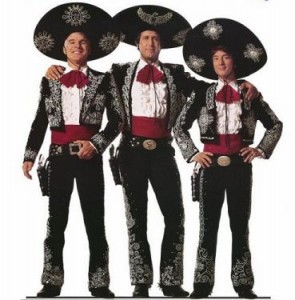 I kind of can’t believe it’s been three months since Michael Schechter, Howie Goldfarb, and I started this series. Where does the time go?!
I kind of can’t believe it’s been three months since Michael Schechter, Howie Goldfarb, and I started this series. Where does the time go?!
Apparently my co-bloggers feel the same because they both decided this was the edition to pester me. Both of them. Separately from one another. So I shall present you with their words with very few edits.
For those of you new to this series, The Three Things arrives in your inbox on Sunday mornings (unless you don’t suscribe, but that can easily be fixed if you hurry over and enter your email address or add to your RSS feed) so you have some extra time to spend perusing the obscure content we’ve curated for you (and one another) before your week begins and deadlines, meetings, and work takes over.
Enjoy!
Michael on Responsibility. Blaming others is easy. It can even be fun. As I type this, I’m blaming Gini for the need to think back through my week attempting to remember what I read in order to pick something for our weekly segment. I mean this whole series was her idea after all. Enjoyable as that may be, this isn’t Gini’s fault, not even a little bit. I committed to doing this with her every week, I enjoy sharing these things, and I forgot to capture ideas for this series as the week went by. So, tempted as I may be to blame Gini for my woes, I can’t. I mean, I can, but I wont. Why? Because earlier in the week Derek Sivers encouraged me to take responsibility, to own that “everything is my fault!” And once I remembered that little tidbit, this week’s “Thing” became clear.
Patented Book System Writes Books in 20 Minutes
Howie on Efficiencies. My esteemed colleagues both wrote took on big writing projects in November. On top of that, Gini co-authored a book with Geoff Livingston that she spent like half a year traveling and promoting after spending lord knows how long writing it. All that work. All that time. But they are slow. Books should only take 20 minutes to write. at least that is how long this professor takes to write his books and he has more than 100,000 of them published and listed on Amazon. In the time it took for me to write these two paragraphs he has written and published two books.
What Kinds of Stories Drive Engagement?
Gini on Engagement. Earlier this year, NPR embarked on an experiment. One that would tell them the types of content people respond to best. One that would help them localize their messages, despite their global reach. One that would “beat” the Facebook algorithm so they wouldn’t have to pay to reach their more than two million fans. After 10 months, they are ready to share their findings. They discovered there are nine types of content that create the most engagement. I think you’ll walk away from reading this with ideas of your own!
Now it’s your turn. Is there a podcast, video, or article you think we need to see?